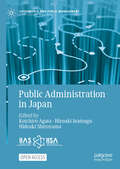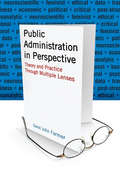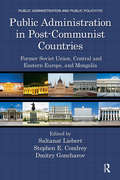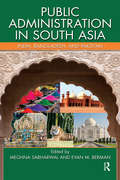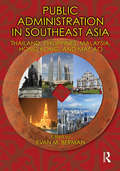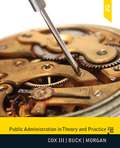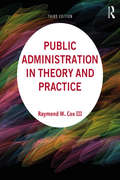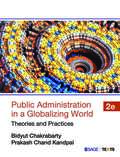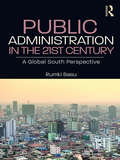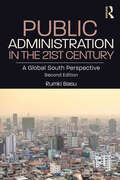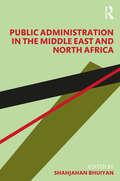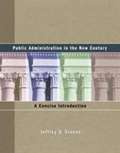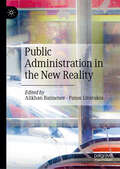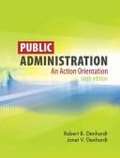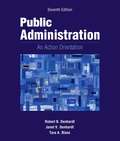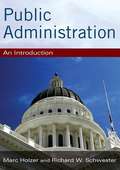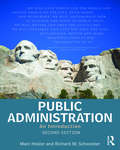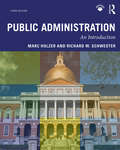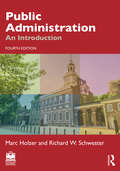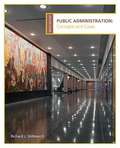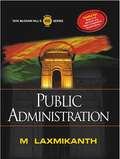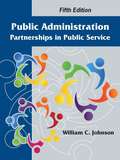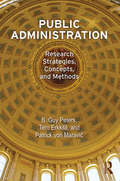- Table View
- List View
Public Administration in Japan (Governance and Public Management)
by Hideaki Shiroyama Koichiro Agata Hiroaki InatsuguThis open access book provides an authoritative overview of public administration, public management and public governance in Japan. Japan is one of the leading countries on the international stage, with a reputation for effective government and administration. The book covers a wide range of themes, including social welfare, public employment, the education system, public finance, and crisis management. Written by a team of expert scholars, it will appeal to international researchers and practitioners interested in Japan, as well as public administration and public management more broadly. It will be the definitive guide to public administration and governance in Japan for years to come.
Public Administration in Perspective: Theory and Practice Through Multiple Lenses
by David John FarmerThroughout its history, public administration has used a number of different perspectives for analyzing the discipline's theory and practice, and both mainstream and alternative lenses have produced valuable insights and prescriptions. At the same time, an individual way of looking at PA can be misleading. Alone, a solitary lens can miss critical aspects and often gives only part of the picture. Public Administration in Perspective has been specifically crafted to give new life to public administration theory and practice by helping readers view the discipline through a variety of perspectives. Designed for the capstone course in public administration programs, as well as a fresh approach for courses in PA theory and organizational theory, this unique book provides a culminating experience--bringing together what has been learned in previous MPA courses without simply rehashing old content. It offers a comprehensive guide to eleven major approaches to PA, and synthesizes them to deepen our understanding of the discipline. Each chapter in Part I describes the key features of the selected perspective--history, content, and proponents--and discusses the strengths and weaknesses related to PA theory and practice. Part II synthesizes the various perpectives, with specific implications for PA management and practice. Part III concludes with a complete overview, identifying ways in which readers can think more creatively and productively about PA, putting the perspectives themselves into perspective.
Public Administration in Post-Communist Countries: Former Soviet Union, Central and Eastern Europe, and Mongolia (Public Administration and Public Policy)
by Stephen E. Condrey Saltanat Liebert Dmitry GoncharovAlthough it has been more than 20 years since Communism crumbled in Central and Eastern Europe and the Soviet Union, many scholars and politicians still wonder what the lifting of the Iron Curtain has really meant for these former Communist countries. And, because these countries were largely closed off to the world for so long, there has yet to be an all-inclusive study on their administrative systems—until now.In Public Administration in Post-Communist Countries: Former Soviet Union, Central and Eastern Europe, and Mongolia, expert contributors supply a comprehensive overview and analysis of public administration in their respective post-Communist countries. They illustrate each country’s transformation from an authoritarian system of governance into a modern, market-based, and in some cases, democratic government. The book covers the countries that were officially part of the Soviet Union (Russia, Ukraine, Moldova, Estonia, Lithuania, Georgia, Kazakhstan, and Kyrgyzstan); those that were theoretically independent but were subject to Soviet-dominated Communist rule (Bulgaria, Hungary, Romania, and Poland); as well as a satellite republic that was under significant Soviet influence (Mongolia). Each chapter includes a brief introduction to the specific country, an overview of politics and administration, and discussions on key aspects of public management and administration—including human resource management, public budgeting, financial management, corruption, accountability, political and economic reform, civil society, and prospects for future development in the region. The book concludes by identifying common themes and trends and pinpointing similarities and differences to supply you with a broad comparative perspective.
Public Administration in South Asia: India, Bangladesh, and Pakistan (Public Administration and Public Policy)
by Meghna Sabharwal and Evan M. BermanA state-of-the-art, one-stop resource, Public Administration in South Asia: India, Bangladesh, and Pakistan examines public administration issues and advances in the Indian subcontinent. The book fulfills a critical need. These nations have the largest public administration programs in South Asia, yet existing knowledge on them is fragmented at best. Bringing together leading scholars from these countries, this book provides both an insider perspective and a scholarly look at the challenges and accomplishments in the region.Focusing on the machinery of government, the book explores questions such as: What is the history of public administration development? How are major decisions made in the agencies? Why are anti-corruption efforts so much a challenge? What is the significance of intergovernmental relations? What is the success of administrative reform? What are examples of successful social development programs? How successful is e-government, and what are its challenges? Why is civil service reform difficult to achieve? How is freedom of information being used as a means to combat corruption and invoke grassroots activism? What can be learned from the successes and failures? While public administration practice and education have become considerably professionalized in the last decade, a sufficiently in-depth and well-rounded reference on public administration in these countries is sorely lacking. Most available books tackle only aspects of public administration such as administrative reforms, civil service, economic developments, or public policy, and are country specific. None provide the in-depth analysis of the sphere of public action in South Asia found in this book. It supplies an understanding of how public administration can be either the source of, or solution to, so many of the problems and achievements in the Indian subcontinent.
Public Administration in Southeast Asia: Thailand, Philippines, Malaysia, Hong Kong, and Macao (Public Administration and Public Policy)
by Evan M. BermanWhile public administration practice and education in general has become considerably professionalized in the last decade, existing knowledge on public administration in Southeast Asia is fragmented at best, and often devoid of a useful reference. While journal articles and government reports provide decentralized information, Public Administration in Southeast Asia: Thailand, Philippines, Malaysia, Hong Kong and Macao takes a comprehensive and comparative look at the major components of administration systems. The selection of countries and regions included reflects the diversity of Southeast Asia.Organized by Country The handbook fills a critical need by bringing together leading scholars who provide an insider perspective and viewpoint on essential and advanced issues. Divided into five sections, each dedicated to a particular country, the text outlines topics relevant to modern public administration, including: History and Political Context of Public Administration Decentralization and Local Governance Public Ethics and Corruption Performance Management Reforms Civil Service System Focusing on recent developments in public administration in these countries which are among the fastest growing economies in the world, the book explores their practices and innovative approaches in public administration. For many years people have been fascinated by the cultures, peoples, and governments of Southeast Asia, and now they have a book that discusses the apparatus of government in Southeast Asia – their agencies, contexts, processes, and values.
Public Administration in Theory and Practice
by Raymond W Cox III Susan Buck Betty MorganHailed for its timelessness and timeliness, Public Administration in Theory and Practice examines public administration from a normative perspective, and provides students with an understanding of the practice of public administration. Combining historical, contextual and theoretical perspectives, this text give students a truly comprehensive overview of the discipline and focuses on the practical implications of public administration theory. Features Normative perspective focuses on the practice of public administration and helps students understand what public administrators do. Historical, contextual and theoretical perspectives provide comprehensive coverage of the subject matter. A thematic overview reinforces the multiple conceptual frameworks or lens through which we see public administration. Students will learn to think through to practical and realistic solutions that acknowledge an historic precedence and theory. Emphasis on performance measures and assessments
Public Administration in Theory and Practice
by Susan Buck Betty Morgan Raymond W Cox IIIHailed for its timelessness and timeliness, Public Administration in Theory and Practice examines public administration from a normative perspective and provides students with an understanding of the practice of public administration. Combining historical, contextual, and theoretical perspectives, this text give students a truly comprehensive overview of the discipline and focuses on the practical implications of public administration theory. This substantially revised third edition features: Increased emphasis on and expanded coverage of management skills, practices, and approaches, including an all-new "Managerial Toolkit" section comprising several new chapters on important topics like transboundary interactions, cultural competencies, citizen engagement, and leadership and decision-making. Expanded part introductions to provide a thematic overview for students, reinforce the multiple conceptual frameworks or lenses through which public administration may be viewed, and provide guidance on the learning outcomes the reader may anticipate. Still deeper examination of the connections between historic theoretical perspectives and current practices, to help students think through practical and realistic solutions to problems that acknowledge historic precedence and theory, yet also leave room for creative new ways of thinking. This expanded analysis also offers a forum for comparative perspectives, particularly how these practices have emerged in other countries. PowerPoint slides, Discussion Questions (with a focus on practice), Learning Outcomes, and "Things to Ponder" at the end of each chapter that may be used as lecture topics or essay examination questions. Public Administration in Theory and Practice, third edition is an ideal introduction to the art and science of public administration for American MPA students, and serves as essential secondary reading for upper-level undergraduate students seeking a fair and balanced understanding of public management.
Public Administration in a Globalizing World: Theories and Practices
by Bidyut Chakrabarty Prakash Chand KandpalThe book is recommended for undergraduate and postgraduate students of Political Science; Public Administration. Revised and updated extensively, this textbook captures the recent and relevant issues that students need to learn to grasp the dialectical interconnection between theoretical conceptualizations and prevalent socio-economic and political circumstances in the context of a transforming world. It examines all the major public policies on environment, health, education and employment, and incorporates the major changes that have taken place in a globalizing world. An essential reading for undergraduate and postgraduate students of public administration and political science, this book will also be useful for students appearing in various Indian civil service examinations and those aiming to clear the UGC-NET exam. Key Features: • Three new chapters added to address the changed milieu and the major issues and debates in public administration • Traces the journey of planning in India from Planning Commission to the National Institute for Transforming India (NITI) Aayog • Includes charts, diagrams, information boxes and tables to illustrate complex issues to the students
Public Administration in the 21st Century: A Global South Perspective
by Rumki BasuPublic Administration has experienced a fundamental rethinking of its basic objectives, concepts and theories during the 21st century. This book examines the transformations happening in global societies, the economy and in politics, to trace the trajectory of public administration as an academic discipline as well as being a focus of social science research. It presents a reassessment of governance in heterogenous developing countries that goes beyond the traditional Weberian bureaucratic model, toward new models of organization and management, informed by their legal, constitutional, economic and political needs, aspirations and ground realities. This is especially important in relation to the marginalized sections of society that primarily rely on citizen entitlements through public service delivery systems. The author looks at widening the range and scope of public administrative agencies with the gradual cooperation of multiple actors, such as the civil society, people at large and even the private sector, in a partnering role. The author revisits the discipline to tackle intellectual dilemmas that current governance theories and practices are confronting, or will have to confront in future administrative situations. There will be key discussions on mandates and challenges for the state regarding the rising South; this book will be indispensable to scholars and researchers of politics, especially governance and public policy, sociology and development studies. It will also be of interest to bureaucrats, NGOs and government officials.
Public Administration in the 21st Century: A Global South Perspective
by Rumki BasuPublic Administration has experienced a fundamental rethinking of its basic objectives, concepts, and theories during the 21st century.This book examines transformations happening in global societies, the economy, and in politics, to trace the trajectory of public administration as an academic discipline, as well as being a focus of social science research. It presents a reassessment of governance in heterogeneous developing countries that goes beyond the traditional Weberian bureaucratic model, toward new models of organization and management informed by their legal, constitutional, economic, and political needs, aspirations, and ground realities. This is especially important in relation to the marginalized sections of society that primarily rely on citizen entitlements through public service delivery systems. The author looks at widening the range and scope of public administrative agencies with the gradual cooperation of multiple actors, such as civil society, people at large, and even the private sector, in a partnering role. The author revisits the discipline to tackle intellectual dilemmas that current governance theories and practices are confronting or will have to confront in future administrative situations in the context of developing countries of the South.In the second edition, the volume brings into focus lessons on policy and governance learnt from the Global South in building administrative capacities in post-Covid-19 times. An essential read on the mandates and challenges for the state regarding the rising South, this book will be indispensable to scholars and researchers of politics, especially governance and public policy, sociology, and development studies. It will also be of interest to bureaucrats, NGOs, and government officials.
Public Administration in the Middle East and North Africa
by Shahjahan BhuiyanThis book examines the status of public administration in eight countries—the United Arab Emirates (UAE), Turkey, Lebanon, Jordan, Morocco, Tunisia, Sudan, and Libya—in the Middle East and North Africa (MENA). This volume explores the issues, perspectives, traditions, and cultures that shape the operation of public administration in the region. This book also offers critical narratives on how the region’s governments manage the state and statecrafts regarding their governance design. It reflects on the multiplicity of public administration structures, functions, processes, and procedures, as well as reform schemes, which are critical in achieving good governance to continuously improve the human condition in the MENA region. Public Administration in the Middle East and North Africa will be of interest to scholars, practitioners, and students concerned with the ways in which technological change, knowledge accumulation, and dissemination can increase a state’s effective governance capacity. Foreword by B. Guy Peters, University of Pittsburgh is freely available to download on the Routledge website.
Public Administration in the New Century: A Concise Introduction
by Jeffrey D. GreenePUBLIC ADMINISTRATION IN THE NEW CENTURY: AN INTRODUCTION TO THE WORLD OF PUBLIC MANAGEMENT, is a concise guide for anyone working toward a career in this field! This concise yet informative text will provide you with a solid introduction to the fundamentals, as well as coverage of the history of the discipline, bureaucracy, organizational theory and behavior, public budgeting, personnel administration, public policy, and ethics.
Public Administration in the New Reality
by Alikhan Baimenov Panos LiverakosThis book combines academic insights and practitioners&’ experience from nineteen countries around the world, and it explores public administration systems capacity in predicting, facing, and reacting to, as well as operating in, the new reality. A reality characterised by considerable levels of volatility, uncertainty, complexity, and ambiguity; all amid rising geo-political tensions, climate change, digital transformation, aging populations, urbanisation, migration, and environmental degradation. These complex and intertwined policy issues put to test contemporary governance structures and current organisational arrangements for public administration systems, as well as the existing competencies and skills of public administrators. Thus, this book explores what public administration systems must do to keep up with the immense changes taking place around us and adapt to the new reality, as well as possess the capacity to forecast, to react and to learn from all past crises and manage competing and conflicting values as well.
Public Administration: A Case Study Approach
by Gerald GarveyThe text incorporates three kinds of study materials: original essays, texts drawn from the scholarly literature, and case studies. By interweaving these strands, students can gain a true appreciation of the profession of public administration while, at the same time, exercising the real-life skills of practitioners in the field.
Public Administration: An Action Orientation (Sixth Edition)
by Robert B. Denhardt Janet V. DenhardtAs its title implies, PUBLIC ADMINISTRATION: AN ACTION ORIENTATION, Sixth Edition, encourages students to become active participants in public administration. Robert B. Denhardt and Janet V. Denhardt instruct readers on how to influence the operations of public agencies--helping them learn to get involved and effect positive changes, regardless of whether they are working outside the agency as citizens or within the agency as managers. With a strong emphasis on ethics, PUBLIC ADMINISTRATION: AN ACTION ORIENTATION, Sixth Edition, introduces the theories and scholarly literature of the field. In addition, it increases students' chances of being effective by developing practical skills such as personal management, communication, delegation, motivation, and decision making. Important topics such as nonprofit management, the global dimensions of public administration, and organizational theory are covered thoroughly in this book.
Public Administration: An Action Orientation, Seventh Edition
by Robert B. Denhardt Janet V. Denhardt Tara A. BlancIssuing a call to action, PUBLIC ADMINISTRATION: AN ACTION ORIENTATION, Seventh Edition, encourages readers to become active participants in public administration--and equips them with the tools to do it effectively. Robert B. Denhardt, Janet V. Denhardt, and Tara A. Blanc teach readers how to influence the operations of public agencies--helping them learn to get involved and effect positive changes, regardless of whether they are working outside the agency as citizens or within the agency as managers. With a strong emphasis on ethics, the text introduces the theories and scholarly literature of the field while reflecting the latest trends and issues. Practical applications help readers sharpen personal management, communication, delegation, motivation, and decision-making skills. Key topics like nonprofit management, the global dimensions of public administration, and organizational theory are covered thoroughly.
Public Administration: An Introduction
by Marc Holzer Richard W. SchwesterMarc Holzer and Richard Schwester have written a fresh and highly engaging textbook for the introductory course in Public Administration. Their coverage is both comprehensive and cutting edge, not just including all the basic topics (OT, budgeting, HRM), but also reflecting new realities in public administration: Innovations in e-government The importance of new technology Changes in intergovernmental relations, especially the emphasis on inter-local and shared regional resources Public performance and accountability initiatives Public Administration has been crafted with student appeal in mind. Each of the book's 14 chapters is generously and colorfully illustrated with cartoons, quotes, and artwork--all reinforcing the book's theme that the field of PA is rooted in the cultural and political world. Each chapter is also supported with a listing of key terms, exercises, and additional resources.
Public Administration: An Introduction
by Marc Holzer Richard SchwesterMarc Holzer and Richard W. Schwester have written a fresh and highly engaging textbook for the introductory course in Public Administration. Their coverage is both comprehensive and cutting-edge, including not only all the basic topics (OT, budgeting, HRM), but also reflecting new realities in public administration: innovations in e-government, the importance of new technology, changes in intergovernmental relations, especially the emphasis on inter-local and shared regional resources, and public performance and accountability initiatives. Public Administration has been crafted with student appeal in mind. Each of the book’s chapters is generously illustrated with cartoons, quotes, and artwork—all reinforcing the book’s theme that the field of public administration is rooted in the cultural and political world. Each chapter is also supported with a listing of key terms, exercises, and additional resources. The textbook is supported by one of the most comprehensive and easy-to-use instructors' manuals of any introductory text on the market today. It contains full lesson plans with activities to accommodate a broad range of teaching and learning styles for each chapter, PowerPoint decks for each chapter (with visuals and links embedded), 8 new long-term project / student presentation ideas, an updated 'Quotes and Notables' section with biographical information and media links for each chatper, updated test questions with answer keys, and updated terms and definitions for each chapter.
Public Administration: An Introduction
by Marc Holzer Richard W. SchwesterMarc Holzer and Richard W. Schwester have written a fresh and highly engaging textbook for the introductory course in Public Administration. Their coverage is both comprehensive and cutting-edge, including not only all the basic topics (organization theory, budgeting, human resource management, etc.), but also reflecting new realities in public administration: innovations in e-government, the importance of new technology, changes in intergovernmental relations, especially the emphasis on inter-local and shared regional resources, and public performance and accountability initiatives. Public Administration has been crafted with student appeal in mind. Each of the book’s chapters is generously illustrated with cartoons, quotes, and artwork—all reinforcing the book’s theme that the field of public administration is rooted in the cultural and political world. Each chapter is also supported with a listing of key terms, exercises, and additional resources.
Public Administration: An Introduction
by Marc Holzer Richard W. SchwesterMarc Holzer and Richard W. Schwester have written a fresh and highly engaging textbook for the introductory course in Public Administration. Their coverage is both comprehensive and cutting-edge, including not only all of the essential topics (organizational theory, human resource management, leadership, program evaluation and policy analysis, budgeting, and the politics of public administration), but also reflecting new realities in public administration: the importance of new technology, changes in intergovernmental relations, especially the emphasis on inter-local and shared regional resources, and public performance and accountability initiatives.New to this edition is a dedicated chapter on big data and analytics to support decision-making and problem solving, as well as updates throughout taking stock of the Covid-19 pandemic in the context of public administration, including politics, decision-making, intergovernmental relations, and the interpretation of data presented to the public. An important new feature of this fourth edition is a fully updated and full-featured companion website, written by the authors, containing instructor and student support materials including PowerPoint slides, cases, simulations and links to videos, designed to engage and encourage students to immerse themselves in virtual problem-solving experiences. This fourth edition of Public Administration has been crafted with student appeal in mind. Each of the book’s chapters is generously illustrated with cartoons, quotes, and artwork—all reinforcing the book’s theme that the field of public administration is rooted in the cultural and political world. Each chapter is also supported with a list of key terms, exercises, and additional resources. This comprehensive, contemporary textbook is an ideal introduction to the subject for upper-level undergraduate and first-year graduate students enrolled in courses in public administration and public management.
Public Administration: Concepts and Cases (9th Edition)
by Richard J. Stillman IIThe book offers a unique and highly regarded framework in which conceptual readings are paired with contemporary case studies that reflect real-world examples of administrative work, as well as new thinking and developments in the field. Case studies and examples cover topics such as the Columbia space shuttle disaster, the shootings at Columbine High School, and the war in Iraq, making it easy to engage students in the readings.
Public Administration: For State Civil Services and Other Competitive Examinations - Competitive Exam
by M LaxmikanthThis book is meticulously crafted to aid students preparing for Civil Service Examinations, starting from the basics and progressing to complex concepts in an easily understandable language. It elucidates different theories related to civil administration with clarity and simplicity, facilitating clear comprehension. Beyond exam preparation, it offers insights into State and District Administration, and Local Government, catering not only to civil service aspirants but also competitive exam candidates, students, researchers, and academic professionals. Featuring study materials organized by chapters and a question bank for enhanced preparation, it ensures thorough understanding with updated concepts. Divided into twelve comprehensive chapters covering topics like Financial Administration and Theories of Administration, it also delves into Administrative Development and New Public Administration. Overall, it serves as a valuable resource for anyone interested in civil services exams or government-related examinations.
Public Administration: Partnerships in Public Service
by William JohnsonThe public sector today permeates much of society. This wide-ranging reach is distilled into a cogent overview of governing in the twenty-first century in the latest edition of Johnson’s acclaimed work. In a clear and engaging style, the author examines the public-private collaborations through which public policies are shaped, implemented, and revised. Throughout, he emphasizes the role of public administrators in forming and maintaining the partnerships that advance the goals of government. Johnson’s well-organized survey draws on both classic works and current issues in describing the organization and operation of American government. Abundant sidebars on current challenges like immigration, health care, disaster preparedness, homeland security, infrastructure investment, and data privacy offer valuable examples of public administration in practice and illuminate the collaborative nature of American governance.
Public Administration: Research Strategies, Concepts, and Methods (Sage Library Of The Public Sector Ser.)
by Patrick Von Maravić Tero Erkkilä B Guy PetersPublic Administration: Research Strategies, Concepts, and Methods explores how scholars of public administration and institutional politics can improve their analysis by focusing on the contextual particularities of their research problems and considering the use of multiple theories and methods. The book functions as an introduction to central themes of public administration and related traditions of research, but also proposes a new pluralist approach for studying public institutions.
Public Administration: Social Change and Adaptive Management
by N. Joseph Cayer David L. Baker Louis F. WeschlerA book of 7 chapters, this text moves from a general discussion of Public Administration to the American Political Context, to theories of organization and management styles. It discusses resource allocation, planning and budgetary systems, and concludes with suggestions for an adaptive approach, improving public administration education, and the new challenges ahead.
